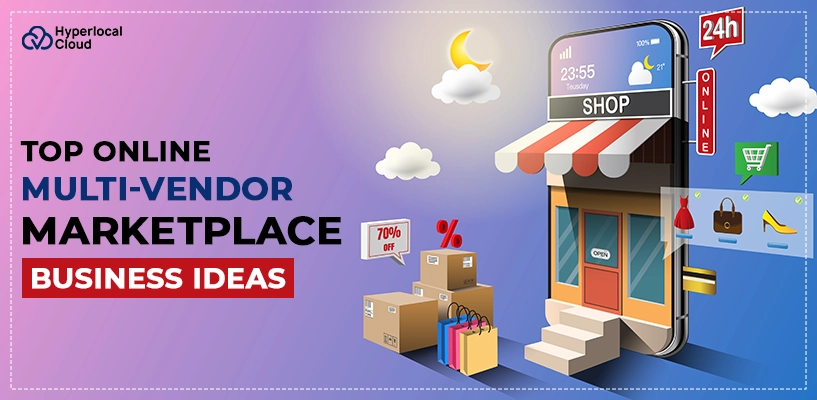Top Online Marketplace Business Ideas For Entrepreneurs

The internet has revolutionized how we do business, and one of the most exciting developments in recent years has been the rise of online marketplaces. Multi-vendor marketplaces provide a platform for multiple sellers to sell their products or services, offering customers a wide range of options in one convenient location. It’s no wonder that this business model has become so popular, with giants like Amazon, Etsy, and eBay dominating the market. But what about the smaller players?
Are there still opportunities for entrepreneurs to enter the online marketplace game? Absolutely! In fact, there are plenty of niche markets waiting to be explored. In this article, we’ll take a look at some of the top online marketplace business ideas that have the potential to be lucrative and successful. So, if you want to start your own online business, keep reading! Before we explore the ideas, let’s briefly discuss what it actually means.
Let’s Begin!
What Is an Online Marketplace?
It acts as a platform that helps connect buyers and sellers to trade the products from the comfort of their homes. The platform owners manage all the transactions and host different vendors, leading to massive business growth.
The top facets of the online marketplace are the multi-sided model with two different user groups, and transactions are facilitated between them. Another important thing is that online rental marketplaces don’t own inventories, and the standard revenue generation method is through the fees charged on processed transactions.
Online marketplaces serve various benefits to businesses. One of them is offering the utmost convenience to customers and sellers, as they don’t need to step out of their homes. All the selling and buying of the product takes place in the comfort of their homes.
Another advantage of such businesses is that they are able to gain the trust of users in a short span of time. The option of easily purchasing and returning the product and getting a refund without facing much hassle is the real thing.
Launch Your Marketplace and Join a Thriving Online Community!
Best Ideas For Marketplace Startup Ideas
Peek into the spectacular online marketplace business ideas that will help you gain an edge in the market.
P2P Industry
Car Rental: One of the most popular businesses that achieves traction daily is the P2P car rental business. The car owners can rent out their vehicles and earn money. Several car rental apps available in the market have achieved remarkable growth. Build an app like Turo and take your car-renting business to the heights of success.
Equipment Rental: Building equipment rental marketplaces have a promising future and offer a vast scope for generating revenue and profit. This P2P business helps companies or individuals rent out their equipment via an online platform and connects renters and owners.
Boat Rental: These businesses provide the most affordable means of transportation for customers who enjoy a beautiful and serene environment. They have exceeded businesses ‘ expectations with spectacular app features like GPS tracking, nautical maps, advanced search filters, a professional dashboard, and customer support.
Online Classifieds: This platform allows people to sign up and upload their listings for trading purposes for second-hand products. When customers find their desired product, they contact the seller and discuss the payment mode. Such platforms can earn money through paid listings, pickup and delivery charges, commission fees, subscriptions, advertisements, etc.
Dress Rental: The boom in fashion is inevitable, and if customers can rent their favorite clothing online, the business will be extremely lucrative. Costume rental markets have seen a fantastic increase in customer engagement, making the industry extremely lucrative. Moreover, integrating AR technology and the online trial rooms has increased users’ reliance on the platform.
On-demand Services Industry
Home Services: Building an app like TaskRabbit offers a spectacular range of services, be it home cleaning, plumbing, carpentry, awning, painting, mounting, etc. This creates job opportunities for handymen who look forward to offering their services. Specifically for them, an on-demand handyman app is a perfect platform to get listed and be part of a vast marketplace.
Pet Care Services: Venturing into the pet care market is an excellent idea, as there is vast growth and satisfaction in building a loving animal community. The hectic schedule makes it nearly impossible for people to spare time to take care of their pets. In that case, pet care professionals and grooming services come into play, and to find them easier, a pet care app is the best place to visit.
Babysitting Services: These platforms help parents quickly find suitable babysitters in their areas with proper background checks. Develop a babysitting app like Uber that offers spectacular services to users, such as care providing, routine maintenance, food preparation, and much more.
Elderly Care Services: Investing in the elderly care business is advantageous not just from a financial point of view but also as humanity reflects on being helpful to the people living in society. There is a gradual increase in online elderly care businesses due to the fantastic set of services offered to facilitate help to senior citizens.
Food Industry
Online Food Delivery: The online food delivery business is expanding rapidly. Its popularity is due to customer’s ability to order their favorite meals at their doorsteps, reserve a table in their favorite restaurants, or place an order for a takeaway. The splendid features, categorized for the admin, customer, restaurant, and delivery personnel, make the app stand out from the others.
Online Grocery Delivery: The on-demand grocery delivery business has eased people’s lives by delivering daily grocery items, like fruits, vegetables, milk, bread, etc, in just a few minutes. Build an app like Gojek for your business that will help you boost customer loyalty, increase customer satisfaction, and enjoy a global reach.
Meat Delivery: One of the most profitable businesses is meat delivery, whether offline or online. However, bringing the business digitally will amplify growth to much higher levels. It encompasses every restaurant model, be it a meat startup, single meat shop, meat chain, etc. It is an ultimate convenience for customers as they don’t need to visit the meat shops or markets, saving them time and money.
eLearning Industry
Online Tutoring Platform: The popularity of the elearning business is at its peak right now, so developing an online tutoring platform for educators and learners will only add to that. The availability of personalized learning, interactive tools, video conferencing, and access to a diverse pool of tutors lead to phenomenal growth.
Online Courses: This type of elearning business deals with providing online courses to the learners that are curated beforehand. The students can revisit the materials whenever they want to enhance their knowledge. Building apps like Coursera and Udemy paves the way for modernised learning through group training, live quizzes, and tests, etc.
Adventure Tourism Industry
RV Rental: The tourism industry is an evergreen market to venture into. Combined with a hint of adventure, travelling and money-making behave like a cheery icing on the cake. From 2025 to 2030, the adventure tourism industry is set to grow at a CAGR of 16.8%. These spectacular numbers show space for ample opportunities and growth, allowing investors to be a significant part of this industry.
Camera Rental: Kickstarting an online camera rental marketplace is a good idea. It’s a flourishing business where photographers, adventurists, and content creators can rent HQ cameras and equipment without paying hefty costs. With the integration of the latest technologies like AR and VR, this rental industry is set to expand and break the ceilings.
Consultation Industry
Online Legal Consultation Platform: By 2037, the legal tech market is anticipated to be $96.08bn and will grow at a CAGR of 9.6% (from 2025 to 2037). The legal consultation platform has top features Like lawyer registration, matter management, appointment booking, document automation, etc.c, to make the consultation easier and seamless.
Online Doctor Consultation Platform: From 2024 to 2028, online doctor consultations are estimated to have 13.7 million users, an increase of 11.74%. (Statista). The patients can access the best doctors without standing in long queues. Moreover, with an app like Practo, the doctors get to work flexible hours and the patient’s medical history with lab reports and tests. On the other hand, the business can gain maximum traction, more users, and skyrocketed profits.
Delivery Marketplace
Alcohol Delivery: With digitalization, the demand for an alcohol delivery marketplace is on the rise. People are fans of alcohol, but visiting the shop every time is cumbersome, and those people are the majority. To cater to the needs of individuals, a wine marketplace like Vivino is being built, helping businesses increase their performance and efficiency.
Flower Delivery: Reach the competitive edge in the market by developing a flower delivery app that helps customers buy and send flowers. The platform caters to single vendors, florists, and multi-vendors to expand their business.
Medicine Delivery: Enhance the customer base, generate massive leads, and increase profits with a medicine delivery app. It acts as a great medium between pharmacies and customers while delivering medicines at affordable costs and that too at doorsteps.
Fuel Delivery: Be a part of the booming industry with an on-demand fuel delivery app that allows customers to order and deliver it without standing in front of gas stations. The platform has attracted more customers with features like fuel level monitoring, real-time GPS tracking, and delivery scheduling.
Start Your Marketplace in Just a Few Clicks!
How To Earn Money By Implementing Online Marketplace Business Ideas?
While providing a platform for sellers and buyers to connect is the primary goal of an online marketplace, monetization is crucial to sustain and grow the business. Here are some common money-making strategies for online marketplaces.
Commission Fees
Charging a percentage on every transaction as a commission fee is a popular monetization strategy. This incentivizes the marketplace to drive sales and ensures maximum revenue.
Listing Fees
Some marketplaces charge sellers a fee for listing their products or services on the platform. Depending on the marketplace’s pricing structure, this fee can be recurring depending on how often the services need to be listed.
Subscription Fees
Another way of generating money is offering users premium features or services in exchange for a monthly or annual subscription fee. These can include advanced analytics, marketing tools, or priority customer support.
Advertising
Online marketplaces often generate revenue through advertising and partnerships. Marketplaces can supplement their income by allowing third parties to advertise their services on the platform.
Transform your marketplace startup ideas into reality with Hyperlocal Cloud!
Entering the online world and expanding your business globally needs a development partner with the experience and expertise to bring your visions to life.
Here are some reasons to choose us for your online marketplace development:
Relevant Experience
We have 4+ years of experience in the IT industry and have helped businesses to stand out from others and reach a new peak of success.
Experience Team
At Hyperlocal Cloud, we’ve experienced professionals who know modern tech stacks to deliver a solution that matches your requirements. Our developers are well-versed in catching trends and developing innovative solutions.
On-Time Delivery
We respect the time and always ensure the product is delivered before the deadline. We also ensure the quality of the project after testing it at different stages and phases, avoiding any hassle afterward.
Satisfied Clients
We have experience working with more than 250+ clients worldwide. We have facilitated our services to startups and enterprises, helping them achieve their dream goals.
Start Your Marketplace Today: Unlock New Revenue Streams!
Bottom Line!!
Online marketplaces have transformed the way businesses used to operate. Moreover, the potential of these multi-vendor platforms is vast, offering countless opportunities for entrepreneurs and established companies alike. By understanding the benefits, exploring top marketplace ideas, analyzing successful case studies, considering essential features and functionalities, and implementing effective monetization strategies, aspiring marketplace owners can tap into this potential and create successful ventures.
Go through the above-listed online marketplace startup ideas and pick the one that fulfills your desires. For more clarity, contact us and get guidance from industry experts.





